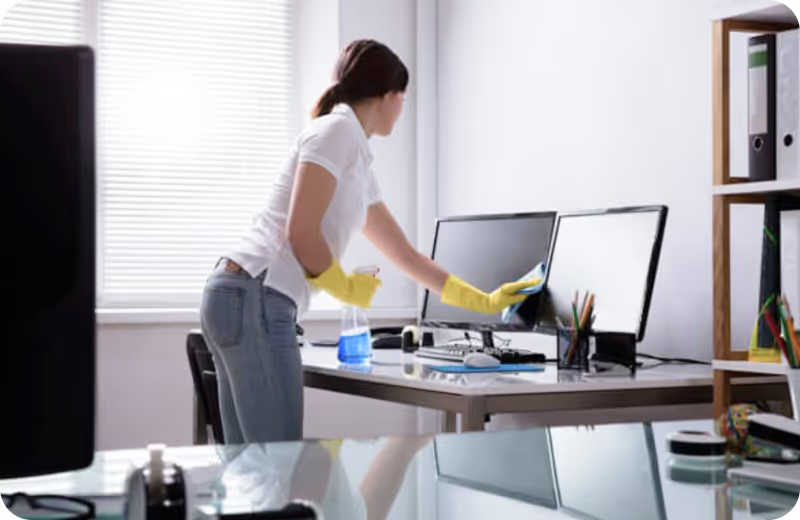
Got a smelly kitchen sponge? There can be a number of factors that cause a kitchen sponge to smell bad: from stale food stains to bacteria. Kitchen sponges handle some of the toughest grime, so it's no surprise that the average kitchen sponge has 45 billion bacteria per square centimeter - that's almost as much as the bacteria in a toilet!
In this article, we'll show you how to properly deodorize your kitchen sponge, and kill bacteria and mold that may be causing the sponge to smell bad. If your current kitchen sponge smells bad, then you should replace it with a new one, and maintain the new one to prevent the smell from coming back.
Why Does My Kitchen Sponge Smell Bad?
Bacteria, Mold, and Mildew
The main cause of a smelly kitchen sponge is bacteria; although mold and mildew are also common culprits. These microorganisms love moisture, and a damp sponge provides them with ample moisture, warmth, and food supply to thrive. They emit smells, and can make you sick when you inhale or ingest them.
Food Particles and Oils
Food particles and oils that have gone rotten can cause smelly sponges. The same goes for dish rags, drying towels, and more. If you notice that you tend to change sponges weekly because it gets grimey, oily, and smelly from pungent food, then you may need to rethink the way you wash your dishes.
How to Keep Sponges from Smelling
Soak in Baking Soda and White Vinegar
Baking soda and white vinegar are known to kill mold and mold spores, and will work well to clean, deodorize, and sanitize your kitchen sponge. To clean kitchen sponges with baking soda and vinegar, wash the sponge in water and use dish soap to remove excess oils and food residue. Submerge the entire sponge in a mixture of 1 cup vinegar, and 1/4 cup baking soda.
Let the sponge soak for at least 30 minutes, or until overnight - the longer, the better. Afterwards, squeeze out the sponge to remove excess cleaning solution, then rinse in warm water. Let the sponge completely air dry before using it again. This method also works with lemon juice in place of vinegar.
Sanitize with Hot Water
This method is best used when the sponge begins to smell. Hot, boiling water will dissolve oils, kill bacteria, kill mold spores, and eliminate odors from your sponge at the same time. While not suitable for the standard plastic foam sponge, this is the ideal way to clean natural sponges and silicone sponges.
Clean the sponge with water and dish soap, then place it over the clean kitchen sink. Heat water on the stove or in the kettle until the water comes to a boil, then immediately pour the hot water over the sponge. Leave the sponge to cool, then wring out the excess water. Dry sponge in a well-ventilated area.
Disinfect with Diluted Bleach
You can opt to disinfect your sponge with a diluted bleach mixture. Mix 1/3 cups of liquid bleach for every 1 gallon of water, and submerge a washed sponge into the mixture. Let the sponge sit for 15 to 30 minutes, then remove the sponge, and rinse away the bleach. Let the sponge completely dry before using.
Rinse Dirty Dishes Before Scrubbing
If your sponge tends to look grimey, dirty, and smelly often, then you may be exposing it to direct food residues. The sponge helps to remove food particles from dishes, but you should rinse the dishes before using the sponge on them.
Wipe away any oily substances with paper towels, and use the hose of your kitchen sink to blast away thick sauces. This will help keep your sponge clean, and prevent it from getting smelly as well.
Kitchen Cleaning Tips
Keeping a clean sponge is part of keeping a clean kitchen. The state of your kitchen's sink determines the cleanliness of your entire kitchen, so it is important to maintain this area of the household as well. Here are a couple of kitchen cleaning tips to consider:
- Wash your sponge daily, and disinfect with hot water to sanitize.
- Let your sponge dry between uses.
- Clean the sink after washing the dishes. Use bleach or hot water to sanitize.
- Clean the garbage disposal, and get rid of any rotten food from the sink.
- Wipe counter tops clean daily using an appropriate cleaning solution.
- Have a routine cleaning schedule to keep track of the areas you've cleaned.
Don't have time to do your kitchen cleaning? We at Luce understand how the average Singaporean can get particularly busy, and our experienced cleaners are more than happy to help you with your home upkeep.
Book an appointment, and feel the difference as you relax in your spotless, squeaky-clean home!





























